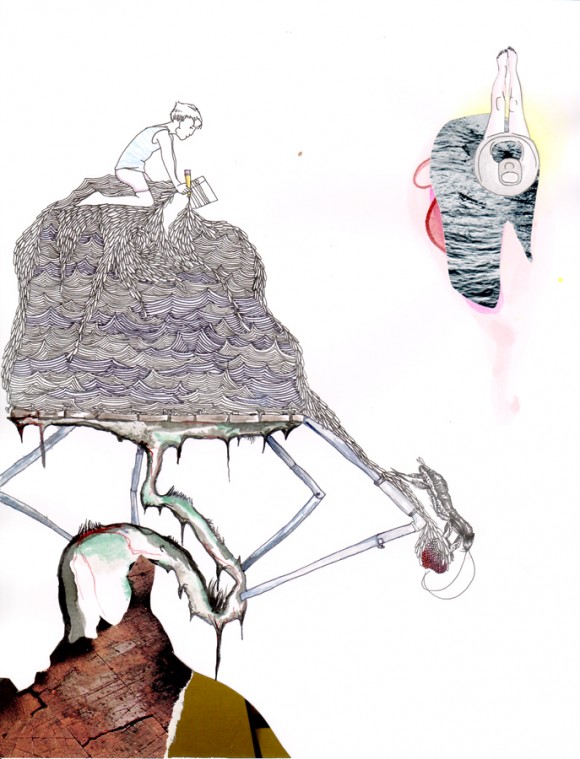The boy sleeps in a waterbed that belongs to his friend, a girl named Christie. One night in a burst of anger he takes a pencil and he punctures the bed and says it was an accident and cannot understand why the adults are mad at him. He feels justified because he hates this. All of this. Later he will sleep on the floor and the floor is far worse. The trailer is filthy with crumbs of food and unwashed dishes and urine of the shitzu dog named Sam. This filth breeds roaches and at night they crawl over his skin and into his ears and he will wake up crying. Later in his life, in his own place, he will never allow food into a bedroom and will never let dishes sit in the sink and will forever be obsessive about this.
This trailer in which he lives sits on the last tract of land on a dead-end dirt street and the neighbors are trash. Across the way a woman named Shelby sits outside during the day and is rumored to have tuberculosis and the boy has been instructed never to speak to her. Next door is a woman named Mary and her son Steven and his father. The parents are alcoholics but this doesn’t concern the boy because he doesn’t know what this means. He becomes friends with Steven and on the weekends they make clubhouses out of scrounged boards and bent nails. They talk about their hatred of girls and school and math and they become friends because of these shared things.
One night the boy stays over at Steven’s trailer. Mary drives them up to the store to buy pizza and she keeps a can of beer between her legs and takes sips between streetlights. They rent movies and watch them at home and eat the pizza and when finished they go to the boy’s room and play with Legos. Come night, the crash of glass and the boys look at each other and shrug. It’s Steven’s father breaking the windows with a bow rake in some drunken rage at Mary. She bursts into the room with a piece of pipe in her hands and locks the door behind her and the boys look at her and she explains that the father is mad. The boys shrug and keep playing but their playing is muted. The boy staying the night wonders for the first time if all parents are fucked up in some way or another and using that adult word concerning adults seems exactly right. They are. They must be. The boy thinks about going back home but doesn’t want to disturb his mother and the other adults there and so he stays.
Mary goes out in the hallway and tells the boys to lock the door behind her and not to come out and they do so and later they fall asleep. Because the boy’s pillow is in the living room he uses a broken Nintendo as a replacement and wakes up later that night to the woman moaning and wonders if she’s dying and wonders too what he’ll tell his own mother. But in the morning she is fine and smiling and he must have dreamt it.
One day the boy’s father shows up and the mother is in tears yet laughing and everyone’s smiling and the boy feels none of these things but he fakes them because he knows he must. His father is an image and a memory and now here his father is and he doesn’t know what he’s supposed to feel and so he hugs the man and goes back to bed. He doesn’t love his father now and will not for many years but his father here means things must get better.
They do. The family moves out into their own place and a year later move far away. Christie’s father calls them from time to time but the boy never wants to speak to him and finally he stops calling. One day while the boy is gone and his father and mother are on vacation Christie calls and leaves a message telling them her father has died. The boy, now a man, shrugs and feels only gratitude. She calls once or twice more but stops calling when there is no good conversation, though she does mention that Steven has turned to heroin. He shrugs and feels only gratitude. She calls once more, years later, to tell them her mother has died. He shrugs and feels only gratitude. He wants them all dead, though the thought has no real malice behind it. He wants them dead because he wants the memory, all of it, gone and he hopes now that it is.
Later, living alone for the first time, working and going to college, an eight year enlistment and a combat tour in Iraq behind him, the boy will hear parents next door younger than he and he will hear them screaming at each other and he will hear young boys crying and he will hear the loud crash of broken glass and with that sound will all of this come back to him. He will write about it because it’s the only way he knows to deal with memory and he will write about it in the hope that recollection will kill it and he knows it is a vain hope but he will write anyway. And here is a boy. Ten years old.
Read more about Jamie Rand here.
Read more about Yana Tutunik here.






















I like the stark style and how it reflects the main character’s numbness to the world. I also like the juxtaposition of wanting to forget with hoping to remember. I love the powerful artwork that highlights the theme of the story so well.